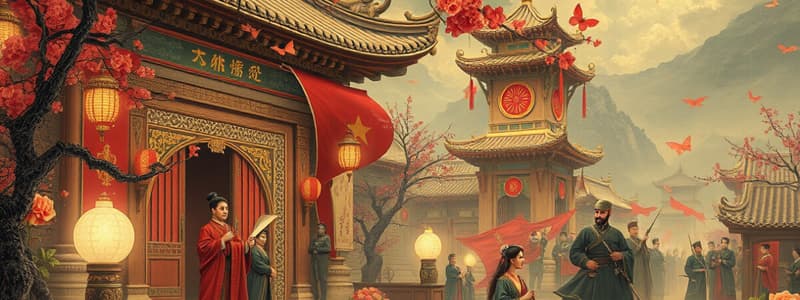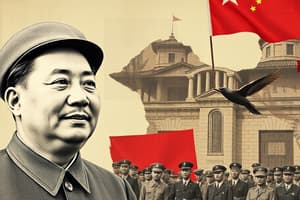Podcast
Questions and Answers
Why did Sun Yat-sen promote nationalism in China?
Why did Sun Yat-sen promote nationalism in China?
He wanted the Chinese people to feel pride in their country.
What is a warlord?
What is a warlord?
A military leader who rules a small area by force.
Who supported the Nationalist Party in the Chinese Civil War?
Who supported the Nationalist Party in the Chinese Civil War?
The United States.
What best describes the 'Three Principles of the People'?
What best describes the 'Three Principles of the People'?
What contributed to the downfall of China's republic?
What contributed to the downfall of China's republic?
As Chinese leader, what did Mao Zedong accomplish?
As Chinese leader, what did Mao Zedong accomplish?
What is the current state of relations between the Communists and Nationalists in China?
What is the current state of relations between the Communists and Nationalists in China?
What is the most likely reason Chiang Kai-shek was able to rule as a dictator?
What is the most likely reason Chiang Kai-shek was able to rule as a dictator?
Which principles were included among the 'Three Principles of the People'? (Select all that apply)
Which principles were included among the 'Three Principles of the People'? (Select all that apply)
Flashcards are hidden until you start studying
Study Notes
Nationalism and Sun Yat-sen
- Sun Yat-sen aimed to instill national pride among Chinese citizens to foster unity and strength in the country.
Warlords in China
- Warlords are military leaders who exert control over specific regions through force, often leading to fragmented authority in China.
Support for the Nationalist Party
- The United States provided significant support to the Nationalist Party during the Chinese Civil War, reflecting its geopolitical interests.
Three Principles of the People
- The "Three Principles of the People" represent Sun Yat-sen's governing philosophies, focused on nationalism, democracy, and socialism.
Downfall of the Republic
- The ineffectiveness of Chinese presidents, who lacked sufficient power, contributed significantly to the collapse of the republican government.
Mao Zedong's Land Reforms
- As a leader, Mao Zedong implemented policies to redistribute land to farmers in rural areas, aiming to enhance agricultural productivity and support peasant rights.
Status of Communist and Nationalist Relations
- The civil conflict between Communists and Nationalists in China remains unresolved, signifying ongoing tensions and ideological divisions.
Chiang Kai-shek's Dictatorship
- Chiang Kai-shek’s ability to rule as a dictator stemmed from China's desire for strong leadership amidst the turmoil following the collapse of the republic.
Components of the Three Principles
- Among the "Three Principles of the People," key components include democracy and socialism, which outline a vision for China's governance and societal structure.
Studying That Suits You
Use AI to generate personalized quizzes and flashcards to suit your learning preferences.




